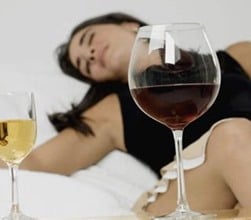A Little Drink At Bedtime May Keep You Awake
How many times have you had trouble sleeping and made your way downstairs to the kitchen, thinking a small glass of beer or a wee dram might send you off to sleep? Alcohol has sometimes been a recommended cure for insomnia. After all, you have passed out when you have had too much to drink, so why shouldn’t it help you nod off?
 Some may not appreciate the impact alcohol can have on your sleeping habits. It seems taking a wee nip before bedtime in the hope it will help you drop off, may be exactly the wrong thing to do.
Some may not appreciate the impact alcohol can have on your sleeping habits. It seems taking a wee nip before bedtime in the hope it will help you drop off, may be exactly the wrong thing to do.
Health and diet experts have now detailed how sleep is one of the most important physical functions affected by alcohol. Even having as little as one or two drinks can have a detrimental effect on your sleep. So, if you are planning to have a nightcap, or down a few before turning in, then you should think about the time. If you take a drink too late, you may be in for a long night.
Drinking at bedtime disturbs sleep.
There is no denying consuming alcohol can bring on feelings of drowsiness, but, if you drink too late it can greatly reduce your sleep quality. Alcohol can indeed help you drop off, as it enhances the chemicals in the brain that cause slumber, but the effects generally do not last long.
This can lead to a more disturbed sleep that if you had not had something to drink. You may find it hard to sleep til morning, have to wake up during the night and may not feel truly rested. Alcohol intake also interrupts your sleep cycle, leaving you feeling sluggish and exhausted the next morning.
It goes without saying, if you have a lot to drink, you may have to frequently get up to go to the bathroom. However, alcohol can also dehydrate you as it is a diuretic. This makes the body expel more liquid, which can be lost through perspiring as well as having to urinate.
Sleep cycles interrupted
Drinking can also have less well known side effects, such as affecting REM or rapid eye movement sleep, which plays a crucial role in your sleep pattern.
REM is the part of the cycle where we mostly dream and replay our memories. Consuming even a small amount of alcohol can be enough to decrease or even interrupt your REM cycle so you may not feel fully refreshed and rested when you wake.
Increased chance of snoring
Having a drink at bedtime can not only impact your sleep quality, but can lead to physical side effects. These can be a source of irritation for your and whoever you may be sharing your bed with. Do you realise consuming alcohol can make you snore? It may not seem that much of a stretch, especially if you have had to listen to your other half snoring all night when drinking with the girls or having a beer with the lads.
Booze may play a part in this, as it can serve as a muscle relaxant, effecting your throat and causing you to snore. This, in turn, can further disrupt your sleep.
Think twice about drinking before bedtime.
 We may feel having a wee dram at night can help us drop off, but it seems it can do more harm than good. If you are looking for a good night’s sleep (and who isn’t?) experts feel you should not drink just before turning in. If planning on having a glass of wine, a spirit, or a beer late at night, it’s best to give your body some time to absorb what you have consumed. It is advised it can generally take an hour to absorb a unit of alcohol from your system. So, perhaps it would be better to stop drinking a couple of hours before going to bed, to prevent a restless night’s sleep.
We may feel having a wee dram at night can help us drop off, but it seems it can do more harm than good. If you are looking for a good night’s sleep (and who isn’t?) experts feel you should not drink just before turning in. If planning on having a glass of wine, a spirit, or a beer late at night, it’s best to give your body some time to absorb what you have consumed. It is advised it can generally take an hour to absorb a unit of alcohol from your system. So, perhaps it would be better to stop drinking a couple of hours before going to bed, to prevent a restless night’s sleep.
It is not uncommon to like a little nightcap, but, in the interests of quality sleep, you may consider putting a cap on bedtime drinking.
https://www.dailymail.co.uk/femail/article-8458159/Exactly-happens-body-glass-wine-try-sleep.html


